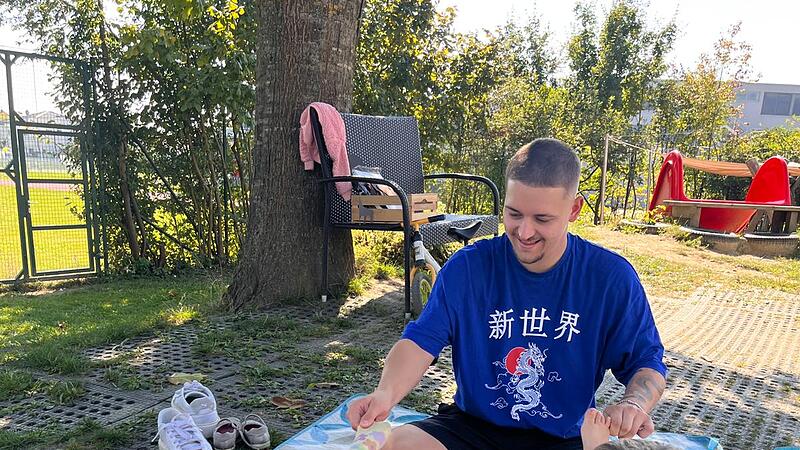If he from “his” When told to children, Benjamin Titz goes into raptures. The 23-year-old will soon be working in his third year as a qualified elementary teacher in the Pfarrcaritas kindergarten in Feldkirchen. We talked to him about the beautiful sides of his job, the challenges and social prejudices.
How did you decide on this career path?
I originally wanted to become a teacher and completed training at the Educational Institute for Elementary Education (BAfEP) in Linz, which forms the basis for becoming a teacher.
The training consists of the areas of early childhood education, after-school care education and kindergarten education. After school, I decided to work as an elementary teacher and started at the Pfarrcaritas kindergarten in Feldkirchen.
How many children do you look after, how many of you are there?
Our team consists of twelve to fifteen people – educators, support staff and assistants – who look after 50 to 60 children. There is a division into rule groups and integration groups. Depending on your needs, care begins at seven or half past seven and is divided into morning and afternoon care.
I am the afternoon teacher leading the group and look after the children from lunch until closing time at 5 p.m.
What do you particularly like about this work and what is challenging?
There are stressful and beautiful moments when working with children. The beautiful moments make up for the strenuous ones. It never gets boring and every day brings new challenges. Beautiful moments, for example, are when you see progress in the children’s development. Or when you come back from vacation and hear that the children have already asked about you and they immediately run towards you excitedly.
There are sometimes difficult days, that’s normal. One problem in this profession is of course the lack of staff. This was particularly evident during the Corona period. In general, social professions are chronically understaffed.
What are your tasks?
My tasks include supervision, observation and further support. This also includes educational work and collaboration with parents. Transparency and good contact with parents are very important. We prepare the children for school and support them in discovering the world through play.
As a man, do you encounter prejudice in your everyday professional life?
Luckily I didn’t experience it myself. I have a great team behind me and the children’s parents have always met me openly and with joy. The prejudice that this profession is a… “Female profession” Unfortunately, you hear it more often, and I also noticed that during my school days.
Men in such professions are also constantly associated in their minds with the topic of abuse. There is often a certain basic skepticism. A phrase I often hear is: “It’s sweet that you work with children.” This irritates me a little, because after all it is my job for which I completed five years of training.
How can children benefit from male educators?
It can be positive for the children to also have male caregivers. Especially for those who do not experience positive male roles in their everyday lives or in the family.
Why do you think so few men take up such careers? What measures could change this?
Many factors come into play here. Social stereotypes and stigmas, for example, which are often expressed at school and in training. The points of pay and low opportunities for advancement also hinder some. Some people still hold the opinion that men have no place in this profession. We worked together against such ways of thinking during training. During my time at BAfEP there were 30 students and 600 female students. But we had a good community and great teachers and also visited other educational institutions in Austria. I am still in contact with many people from that time.
It is important to exchange ideas with each other and to support each other. This should also be promoted by institutions and training centers and the clear message should be conveyed: Men, we need you, you are wanted! Because men can do it too! A lot has already happened in this regard, but we are still far from reaching our goal. Maybe just at the starting line.
What can you learn from children as an adult?
To live in the here and now! Children live very intensely in the moment. There are always moments in everyday life when everything feels like it’s going wrong, but the next moment it looks completely different again. Unfortunately, we adults eventually forget how to live in the moment. We can learn a certain simplicity and freedom from children. That it’s not always just about work, money and doing, but that even simple things can be very beautiful. If we allow it.
Do you have any tips for others who want to pursue a similar career path?
It’s a great job! You shouldn’t let prejudices or possible bad experiences in your training stop you. In practice, things look completely different. It’s challenging, exciting and really hard work. Working with people is something very special anyway and is rewarded in a completely different way than is the case in other professions. Some of the children I cared for will always remain in my memory.
more about youth and work




